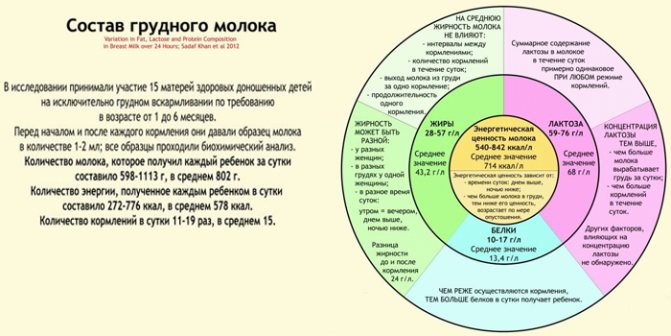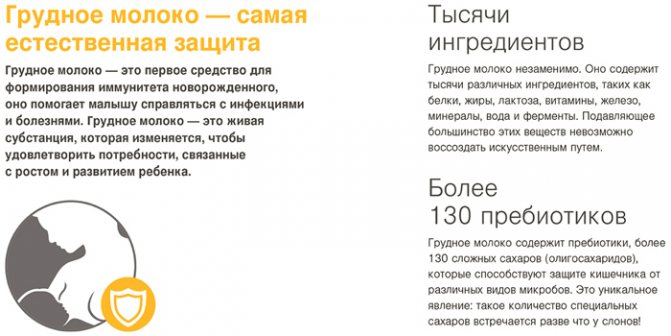Benefits of Breastfeeding
The benefits of breastfeeding are numerous.
In fact, breastfeeding is equally beneficial for both the baby and the mother.
Benefits of breastfeeding for a baby
First let's look at the benefits for the tiny eater:
- thanks to breastfeeding, the baby’s immunity is formed and becomes stronger, the risks of developing many dangerous ailments, and even cancer, are eliminated;
- Mother's milk protects against various gastrointestinal problems, including constipation, intestinal infections, and diarrhea;
- GW is an excellent prevention of food allergies;
- minimizes the risk of infantile atopic dermatitis;
- scientists have proven that mother-fed children are less likely to have their tonsils removed (they need it less), and are less likely to suffer from vision problems and otitis media;
- mother’s milk contains less salts and protein than the most perfect mixture; it does not put extra strain on the still immature baby kidneys;
- the sucking process develops the jaw muscles and reduces the risk of bite problems, and hence speech problems;
- fats in mother's milk contribute to improved formation of nerve tissue;
- ailments such as bronchial asthma, various types of influenza, pneumonia, respiratory infections occur less frequently;
- The gradual change in the taste of mother's milk perfectly prepares the baby for new, solid food.
Breastfeeding a newborn and benefits for the mother
The advantages of breastfeeding for mothers are expressed in the following moments:
- if she gained extra pounds during pregnancy, then breastfeeding will help remove them effortlessly, because it eliminates a large number of calories and speeds up metabolism;
- during lactation, the mother’s body intensively produces oxytocin, thanks to which the uterus can quickly return to its prenatal state;
- breastfeeding reduces the risk of heavy bleeding and postpartum complications;
- it, thanks to close, special contact with the baby, stabilizes the emotional state of a woman and saves her from depression.
Benefits of breastfeeding for a baby
No matter how well and correctly the formulas for feeding children are advertised, breastfeeding cannot be replaced by any of them, because this is a unique nutrition provided by nature.
The benefits of breastfeeding for a child are very obvious and include the following:
1. Breast milk is absorbed at least twice as well as formula. It contains the necessary enzymes that help digest all substances supplied to the baby.
2. Breast milk contains the full range of nutrients for the full development of the newborn. After all, nature has it in such a way that as the baby grows, the composition of mother’s milk changes, adapting to all the needs of the growing body. In addition, it has been established that infants develop slightly better and more actively than children on artificial nutrition.
3. Breast milk forms a healthy immune system and prevents the development of infections in the baby’s body. Since the baby’s immune system is quite weak, breast milk is designed to protect the baby’s body with the help of the immunoglobulins it contains. For example, the incomparable type A immunoglobulins (or IgA) are very significant for the newborn’s body. At the local level, they guarantee immunity to the mucous membranes of the gastrointestinal tract, as well as the respiratory and genitourinary systems.
The largest amount of IgA is found in colostrum - 16 mg per 1 ml. Therefore, it is extremely important to put the baby to the breast for the first time as soon as possible after birth, so that the newborn sucks the first drops of valuable liquid that precede full milk. The very next day after birth, the amount of immunoglobulins decreases. During the first week it becomes stable and until the ninth month it is 1 mg per 1 ml.
In the first 24 hours, colostrum provides the baby’s body with at least a thousand mg of class A immunoglobulin. Subsequently, the newborn’s intestines receive the same volume due to frequent feedings and the volume of breast milk drunk. In addition, together with IgA, breast milk also carries other types of immunoglobulins - M, G, D.
If a nursing mother gets sick with ARVI, then the baby, thanks to the antibodies in the mother’s milk, either will not get sick at all, or recovery will come much earlier. Statistics and the experience of nursing mothers indicate that infants are much less susceptible to diseases than “breast-fed” babies.
4. When the mother follows the diet, the child suffers significantly less from intestinal problems. A favorable environment and beneficial bacteria that penetrate the intestines with milk promote digestion, prevent colic, bloating and excessive regurgitation.
A baby's stool may be irregular for up to six months, which in most cases is normal.
At the same time, rare stool in a breastfed baby is considered the norm, because only in the first weeks stool should accompany each feeding. And in the following months, up to about six months, the baby can recover only once every few days. If these days his health does not deteriorate, he is calm and pees 12 or more times, then there is no reason for concern, and WHO says the same.
5. Breastfeeding promotes proper care for a child when sick. A sick baby needs plenty of fluids, and the mother's breasts fully satisfy this need if the baby literally hangs on the chest for any amount of time. And besides drinking, breastfeeding will help the baby calm down faster and sleep soundly.
6. The proteins contained in breast milk do not cause allergies in children in the same way that proteins from cow's or goat's milk can. Every second child does not tolerate them well, and with natural feeding, the baby can try them after two years.
7. In addition to food, breastfeeding is also a close connection with the mother, which the baby needs for safety, comfort and the feeling that he is not alone and is loved.
The tactile contact of the child with the mother, their relationship during feeding lays in the baby the correct ability to love and be friends with others in later life. Closeness and a feeling of attachment to the mother form in the child only positive qualities of his character and make him a confident person, emotionally disposed towards other people.
8. Breast milk charges the baby’s body with the hormone of happiness, which is why he often feels good and is in a joyful mood.
9. Breastfed children are less likely to suffer from rickets, anemia or diathesis. At an older age, they often do not have diabetes mellitus or bronchial asthma.
10. Breastfeeding also affects the child’s mental development, since milk contains sugars and fats that affect intelligence and brain function.
11. The mother's breast, if desired, eliminates the use of a pacifier and completely covers the sucking reflex.
Easy to digest
Breast milk contains proteins, carbohydrates, fats and vitamins. A big plus is that the substances are perfectly balanced in composition. It changes depending on the child's needs. Compared to artificial formula, milk is easily digestible. This occurs due to the balance of proteins – casein and whey protein. They improve digestion, intestinal microflora, and prevent the development of harmful microorganisms.
Breastfed babies are less likely to experience gas, constipation, or diarrhea.
The calorie content of milk is provided by lactose. It quickly saturates the child’s stomach, so he eats little and often. Lactose promotes the absorption of magnesium, calcium and phosphorus, which strengthens bones and heart muscle. The amount of vitamins in milk depends on the mother’s diet, so she needs to adhere to a balanced diet and take vitamins.

Increased intelligence
Studies have shown that consuming mother's milk improves brain function. Breastfeeding children have a higher level of intelligence due to the fats and acids in milk. They improve the functioning of the nervous system and strengthen the retina of the eyes.
Transfer of immunity from mother
In a newborn, the body's defenses have not yet developed to protect it from viruses or bacteria. Plus breastfeeding - the baby receives immunoglobulins from the mother through milk, which prevent many diseases. These include pathologies that the woman suffered from. This way the child receives passive immunity for a while until his own defense system is formed.
Breast milk contains living cells called white blood cells. They help fight pathogenic microorganisms.
Thanks to hormones, enzymes and antibodies, breastfed children are less likely to suffer from certain infections:
- inflammation of the meninges;
- bronchitis or pneumonia of viral origin;
- salmonella or E. coli.
The reduction in the risk of ear infections in breastfed children is not only due to passive immunity. When sucking, swallowing and breathing, pressure increases in the newborn's ear. This improves the activity of the Eustachian tube and reduces the likelihood of air or cerumen plugs.

Cons of breastfeeding
Are there any downsides to this wonderful process? Let's be honest, they are:
- drowsiness of the mother - appears due to the influence of the pleasure hormones endorphins on her body, the latter try to relax during feeding;
- decreased libido - due to the high level of the hormone prolactin (an increase is provoked by breastfeeding), the production of estrogen decreases, and it is this hormone that is responsible for sexual desire;
- concentration of attention also decreases - the same prolactin makes sure that the new mother’s attention does not dissipate, but belongs 100% to the baby;
- difficulties in a woman’s eating behavior - can be expressed in cravings for fatty or sweet foods, as well as severe thirst, or even mild nausea, this occurs due to the influence of oxytocin, and gradually passes;
- a change in the social role of a woman - if earlier she could be a valuable employee, a daughter, now she is primarily a mother and a source of nutrition for a new little person.
Of course, all these disadvantages exist. But they are not an argument to exclude breastfeeding.
So, if the process is streamlined and all the rules are followed, then the advantages of breastfeeding definitely outweigh the disadvantages.
There can be no “pros and cons” arguments here at all - if there are no medical contraindications, the baby needs to be fed.
Arguments against formula feeding
In most cases, women choose to feed their baby with formula not because they cannot breastfeed, but because they consider this method of feeding more convenient for themselves. At the same time, many young mothers do not understand that by doing so they are not only depriving their child of adequate nutrition, but also creating many problems and troubles for themselves: not a single artificial formula can provide the baby with such reliable health support and protection from diseases as mother’s milk.
No pediatrician will recommend feeding a child formula unless there are serious contraindications to breastfeeding. Even insufficient lactation is not a reason for refusing to breastfeed children. Full production of milk in sufficient volumes does not begin immediately after the birth of the child, but only after two weeks. There are many ways to quickly normalize lactation, so in such cases it is very important to once again familiarize yourself with the benefits of breastfeeding and make a little effort to stimulate milk production.
Breastfeeding rules
The following basic principles and valuable tips will help even the most inexperienced mother breastfeed her baby without difficulty:
- Proper breastfeeding is the main key to success. Only if the attachment is correct, the baby will not injure the mother’s nipple, and the breasts (right and left) will be fully emptied during feeding. It is important that the baby carefully grasps both the nipple and the areola (especially its lower part) with its mouth.
- The position should be comfortable, conducive to relaxation, while the mother who is feeding can sit and lie down.
- At the very beginning of a long journey, nighttime meals are especially important - the baby must eat from 3 to 6 am, because the mother’s brain produces the most prolactin at this time, which is responsible for the production of the “fluid of life.”
- Mom is required to drink 2 liters, or even 3, per day (of any healthy liquid or just water). It is also important for her to drink at night. Hence the advice: place a bottle of water, compote or milk next to your bed for yourself.
- It is very important to get enough sleep, remain calm, and have a stable emotional state.
- If you have problems (breasts are very engorged or inflamed, there is little milk, nipples are injured, the baby is not latching correctly, etc.), read the material about how to establish breastfeeding. In addition, it is important to contact an experienced specialist in a timely manner.
The unique properties of breast milk
Most of the benefits of breastfeeding come from the unique composition of breast milk. The composition of breast milk has not yet been fully studied, and many of its components cannot be synthesized. For example, molecular fatty acids necessary for proper brain development simply cannot be included in the mixture. This is why feeding a baby with formula cannot be considered a complete replacement for breastfeeding: not a single artificial formula contains the set of valuable components that are present in breast milk.
The knowledge of most modern mothers about the value of breast milk is in most cases limited to the fact that it contains nutrients and antibodies that create the baby’s immunity in the first six months of his life. However, not every woman knows that the composition of breast milk is constantly changing, adapting to the developing body of the child.
The most amazing thing is that breast milk changes its composition in such a way as to satisfy the individual needs of the child - throughout lactation, at each specific moment, milk is produced of the exact composition that the baby needs and is vital for his health and proper development.
Thus, in women who gave birth to premature babies, the composition of milk during the first two weeks is as close as possible to colostrum, which supports the baby’s body. And for mothers who have given birth to twins, milk may differ in composition in different mammary glands.
In the last stages of lactation, milk becomes similar to colostrum, and the level of immunoglobulins in it increases as much as possible in order to give the baby as many antibodies as possible, which will protect him for another six months after stopping breastfeeding. It is clear that it is impossible to achieve the same effect when feeding a child with formula.
How and when to breastfeed a baby?
How to start the breastfeeding process correctly? This question is often asked by new mothers. It turns out it's not all that complicated. You just need to know some nuances and not miss the moment.
Milk usually comes into the breast on the 3rd day, but it is extremely important that the newborn is attached to the breast in the first minutes of life.
Fortunately, most modern maternity hospitals practice this kind of application. Staying in the ward together between the baby and his mother also contributes to a strong bond and successful breastfeeding.
A mother should put her baby to her breasts (one at a time) as often as possible.
Even if the baby does not actively suckle yet, this will still become an incentive for sufficient lactation. No special preparation is required - the breasts do not even need to be washed with soap, as was taught before.
In the first months, it is important to feed literally at the very first request of the tiny eater, and in no case according to the clock.
There should be no bottles, no nipples, no extra water at the very beginning.
How to properly breastfeed a baby?
- The baby's lips and gums should wrap around and squeeze the areola (the circle around the nipple), and the nipple itself should be deep in the mouth.
- at least once every 3 hours, and preferably more often. This will just help the breasts adapt to the needs of the baby, as if to “synchronize” with him.
Signs of a hungry baby
Here are the signs of a baby who wants to eat:
- the baby restlessly turns his head, opens his mouth, as if looking for his mother’s breast;
- he can stick out his tiny tongue;
- fidget, grunt lightly;
- or maybe just cry loudly, even when his mother takes him in her arms but does not give him the breast.
Breastfeeding a newborn and diet
Modern principles of civil war are quite democratic. Even a hypoallergenic, special diet is not required for mommy.
Modern research confirms that mothers’ dietary restrictions do not have a decisive influence on the manifestation of allergies in children.
Therefore, a woman can eat according to her taste, quite varied. But – as healthy as possible, and without “excesses”.
Nutrition should go like this: minimize junk food with artificial additives, maximize simple and healthy food for better lactation.
Such foods include: vegetables and fruits, grains and legumes, nuts, dairy products, as well as fish and meat. Fatty foods, red fruits, and carbonated drinks are also undesirable.
Introduce new foods boldly, eat what you want - but first in small quantities to check the baby’s reaction.
And preferably in this mode: 1 new product per week.
Breastfeeding and alcohol
Alcohol, by the way, is allowed by modern adherents of breastfeeding, but in very moderate doses, and if the baby is already older than 3 months. Mom can afford 1 glass of wine, taking into account the fact that its concentration in milk will reach its maximum after an hour and a half. Alcohol will be released after 2-3 hours. Therefore, it is better to allow yourself a glass immediately after feeding, express milk an hour later, and feed after 3 hours.
And it’s better, of course, to give up even moderate doses of harmful alcohol while breastfeeding. There is no need for the child to “absorb alcohol with mother’s milk.”
Breastfeeding is the basis of baby's health
Reduces the risk of infectious diseases
Breastfed babies are less likely to get pneumonia. They are more resistant to colds, viral and gastrointestinal infections.
Reduces the risk of chronic diseases
Breastfeeding your baby will reduce your baby's risk of developing type 1 diabetes, Crohn's disease, and inflammatory bowel disease.
Reduces the risk of sudden death syndrome
Scientists have proven that breastfeeding reduces the risk of sudden death syndrome in a child by almost half.
Excellent cancer prevention
Breastfeeding significantly reduces your baby's chance of developing certain types of cancer (those that occur in children). You also reduce your risk of developing ovarian and breast cancer, as well as osteoporosis.
Slender mother - slender baby
Neither the child nor his mother gains excess weight.
Breastfeeding reviews
Alina, 32 years old: “When I started breastfeeding, I was most worried about my breasts. But now I can say: it’s really possible to keep in shape: do exercises, apply creams, live in a bust. I’ve been breastfeeding for a year now, my shape is no different from prenatal, my breasts haven’t sagged a centimeter, hurray!
Katya, 28 years old: “I was not eager to feed, my husband and mother persuaded me, because milk is better than formula. And now I’ll say - it’s easier to feed yourself than to run around at night for formula! So, if you feel sorry for yourself and love your baby, just feed it!”
Tanya, 34 years old: “At first I had lactostasis, it was very unpleasant. But my husband’s set with a breast pump saved me)). Now my son is already 3 months old, I feed him perfectly, anywhere, no problems!”
Of course, breastfeeding a newborn is an unforgettable personal experience for every woman. And I really hope, dear readers, that now you will understand exactly how important and necessary this is! Good luck to everyone, thank you for your likes and comments on this article, see you next time!










